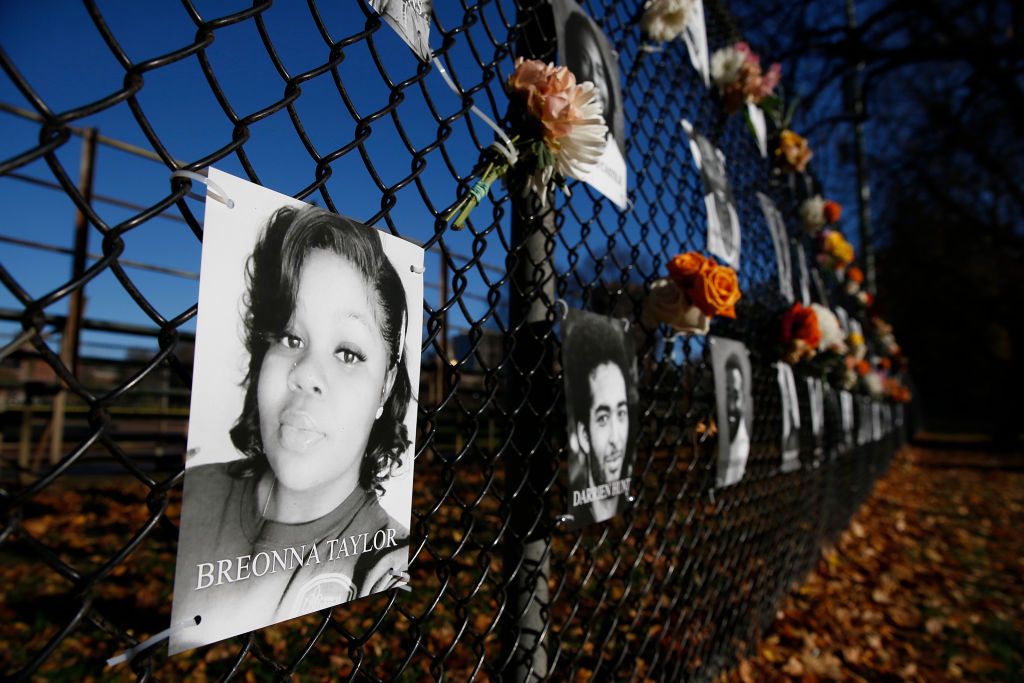How The Racist War On Drugs Killed Breonna Taylor

Source: Boston Globe / Getty
This time last year, Breonna Taylor lived not as a hashtag or social justice martyr, but as a Black woman enjoying the youthful essence of her life.
There were days where she was just a daughter, or a sister. A day dedicated to her partner, and to working as an EMT. And days where she contemplated about her future. Her death, like her lived experience, was subjugated to a complicated structure; Taylor was a Black woman living in America.
“There is no thing as a single-issue struggle because we do not live single-issue lives,” the prolific writer Audre Lorde once said. Taylor’s death exemplifies what happens to Black women who are routinely caught in the crossfires of the war on drugs, riddled with restricted access to their reproductive and civil rights under the pervasive umbrella of systemic racism.
In Taylor’s case her ex-boyfriend, Jamarcus Glover, was the subject of an ongoing drug investigation by the Louisville Metro Police Department. Members of the LMPD used Taylor’s past affiliation with Glover as a means to criminalize her by including her in their probe.
This year marks the 50th anniversary where President Richard Nixon declared drugs “public enemy number 1.” Nixon’s Controlled Substance Act, which set precedent for President Ronald Reagan‘s Anti-Abuse Act, laid out a series of motions which largely attributed to harsher prison penalties and the militarization of the police.

Source: Jon Cherry / Getty
“We need to have a full conversation about why people use drugs and why people sell drugs,” said Kassandra Frederique, executive director of the Drug Alliance Policy (DPA). “And I think that what we know is that the drug war infrastructure has shifted and perverted so many parts of our lives. It has fundamentally changed policing in this country, in the equipment they have, in what they’re allowed to do.”
Taylor’s death exemplifies what happens to Black women who are routinely caught in the crossfires of the war on drugs, riddled with restricted access to their reproductive and civil rights under the pervasive umbrella of systemic racism.
As law enforcement received billions of dollars from the federal government to wage war on drugs, police increased their presence in Black communities. The influx did not equate to law and order, but instead amounted to more arrests, specifically drug raids and searches.
As a result, Black and minority communities are disproportionately represented in terms of drug arrests. According to the NAACP, “5% of illicit drug users are African American, yet African Americans represent 29% of those arrested and 33% of those incarcerated for drug offenses.”
For Black women, the war on drugs permeates their roles as mothers, daughters, sisters, and partners. Over the last 40 years, the Black woman population in state and federal prisons has grown 800 percent according to the DPA. A large number of Black women sentenced to prison were convicted for non-violent offenses, including drug possession or intent to sell.
“I think some of the things that are super important to name is that a lot of the things that happened created the conditions for Breonna to be killed,” said Frederique. “So one, I think it’s important to know that women in particular often get caught up in drug investigations based on their associations. They usually have nothing to do with it, but because of the vast scope that police officers are given when they’re making their investigation, they often target women for their associations, either their loved ones or people they’re in romantic relationships with, and they have no or minimal involvement in drug activities.”

Source: Christina House / Getty
Two Supreme Court decisions as a result of the war on drugs enabled LMPD officers to force their way into Taylor’s apartment on March 13, 2020, and end her life. The 1995 case Wilson v. Arkansas determined officers could opt out of announcing themselves while executing a warrant, if they felt it would lead to the suspect destroying evidence or fleeing. In 1997, Richards v. Washington determined that opting out of knocking and announcing is legal under the Fourth Amendment as long as the decision to do so is reasonable under the circumstances.
In Taylor’s hometown specifically, a study by the Louisville Courier Journal showed that of the no-knock raids conducted by the LMPD between 2018-2020, 82% of the targets were Black, and 68% took place in predominantly Black neighborhoods.
No drugs were recovered in Taylor’s apartment.
Taylor’s death marked a significant turn in the movement, where the names of Black women, Black trans women and Black girls victimized by the police are often erased.
“I think people consistently erase the harm that is happening to Black women, cisgender and nonconforming,” Frederique said. “I think what we know is that Black women and girls are being harmed and killed from lies and surveilled in so many different ways. And oftentimes our view of how these things play out and our policies are really myopic. They only focus on something and they don’t look at the fullness of the picture.”
SEE ALSO:
Louisville DA Who Recused Himself From Breonna Taylor’s Case Can Prosecute Cops Now, Activists Say
Mobile Billboard Honors Breonna Taylor And Her Dream Deferred Of Becoming A Mother
[ione_media_gallery id=”4027721″ overlay=”true”]

